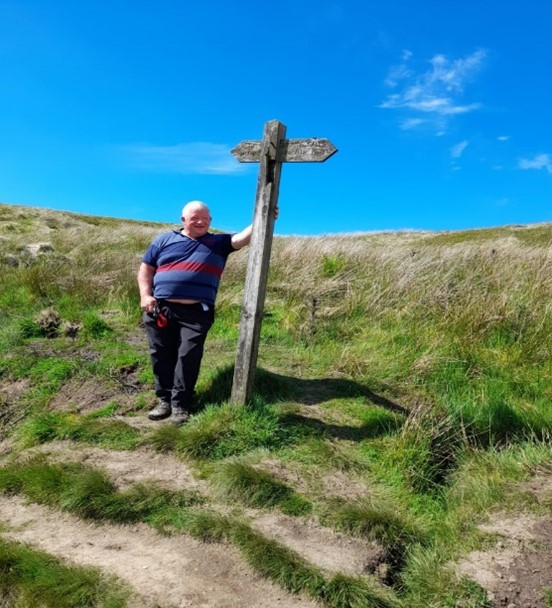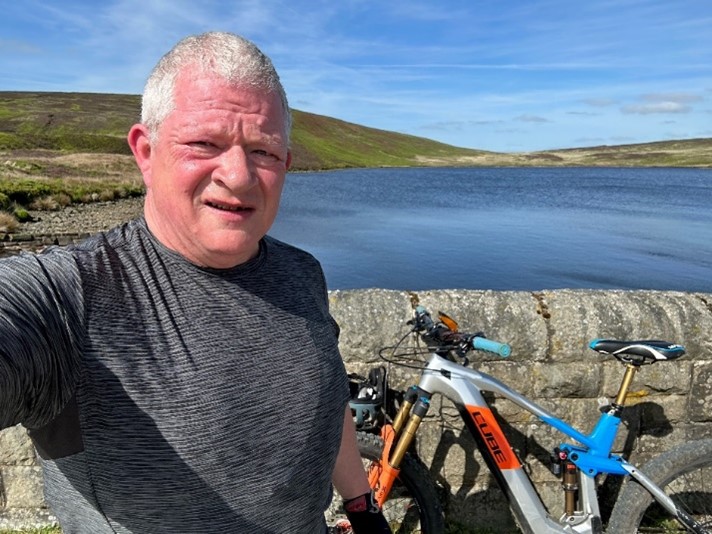Hi, my name is Simon, and this is my story of completing the NHS Low Calorie Diet (LCD) programme. The programme will soon change its name to ‘NHS Type 2 Diabetes Path to Remission (T2DR)’. This is because it was felt that the words ‘low calorie diet’ in the original name may have been a deterrent to people taking up the programme. However, the name didn’t bother me, and I’ll refer to the programme as the total diet replacement programme – as this is what I participated in.
In late 2021, I was complaining of a dry mouth, and in early 2022, I was asked to go for a workplace ‘medical’ so I could get health clearance to be able to continue with my work. I asked about my dry mouth at the consultation and then asked by the nurse to provide a urine sample. I did, and my urine test showed I had high sugar levels.
She advised me to go and see my GP or another health care professional. I contacted my GP practice and was booked in for an appointment with a nurse linked to the diabetic clinic (which is held at my GP practice).
Whilst there, the nurse explained my urine test results and confirmed I had type 2 diabetes. She also asked me if I would be interested in going on the free NHS Type 2 Diabetes Path to Remission Programme, explaining to me what it involved, including the need to make changes to my diet. She did tell me that not everyone finds it easy to do. However, this made me more interested and didn’t put me off signing-up.
The whole programme lasted for a full 12 months and was offered a digital app (which can be used on a smartphone or tablet). This allowed me to access online learning modules, submit measurements and seek support and answers to queries I had via a chat function connected to a trained health coach. At the time there was no in-person offer for the programme in my area, although I believe this is changing and a face-to-face offer will be an option for people who sign-up.
The total diet-replacement aspect of the programme lasted 12 weeks and during this time you eat 800 calories a day, consisting of substituted meals. For example, I could have four shakes, or 4 soups or a mixture of each, each day. You could choose which combination of these you wanted. I used to have my shakes in the morning and again at dinner time; then I'd have a soup at around teatime/supper. I liked the shakes the best (particularly chocolate). The soup was very thick, but it has all the nutrients you need. The products themselves were fine and are provided for you. I was given a code to order them online and delivery was straight to my house.
What I liked most about the programme was the people I connected with digitally. I liked the live chats during the programme on my phone – I had never done something online in this way before. We shared tips including how to try different ways to make the soup more tasty but low in calories.
When I started the total diet replacement programme, I weighed 19 stone. However, over the first 12 weeks, I managed to lose approximately 4 stone. I kept that weight off for the remaining 9 months of the programme.
After the initial 3 months, you are introduced to healthy food and bringing this into your diet. You are also taught quick and easy ways to calorie counting, as well as the main food types - carbohydrate, proteins and the like. I found it easier to look at pictures – to see what looked tasty (and healthy) and what portion a size was.
After month 3, my calls went from weekly to one every month. The LCD team ring you up and you are asked to weigh yourself and check your blood sugar levels and feed this back. You also get asked for your blood pressure readings. At this time, you are also reintroduced to other foods again and I went up a bit in weight. This is understandable as I am again eating three meals a day – nevertheless I know I'm a lot healthier and I have sustained this healthier way of living even after completing the programme.
I finished the total diet replacement part of the programme in the first week of September 2022; however, my last support call was at the end of June 2023. The programme helped me in so many ways – not just to lower my daily calorie intake. It made me more active, more able to get about – helped by the fact I had lost so much weight. I do a lot of mountain-biking and realised I could go a lot farther than before starting the programme. The health benefits of it to me –the weight loss and the increased stamina and ability to exercise more - were phenomenal.
The biggest difference for me was losing the weight. After only 6 months my blood tests showed I had gone into type 2 diabetes remission. I worried about the diabetes coming back but with the help of the programme and the people doing it alongside me, I overcame this fear. The support I got was incredible.
Every day I check my blood sugar levels and my results are reassuring. I have had three tests with my GP practice nurse since completing the programme, and they show me that I am still in remission. Achieving this is all down to this programme and the support I got. When you are on the programme, the realness comes from those you meet, those who are going through it with you. When someone new starts, we share our experiences with them.
Yes, it's not the easiest thing in the world. I went to a barbecue in the middle of the programme, and I couldn’t have a drink nor eat the food that was there. But I got over it. I feel a lot better in myself; I have more energy.
It's been life changing.
This is me before I did the total diet replacement programme:

This is me now: Exactly 12 months from completing the programme

I would recommend others with type 2 diabetes to think very seriously about participating in the NHS type 2 diabetes path to remission programme. It is by no means a walk in the park; but it is lifechanging for the better.
My advice to anyone who has had type 2 diabetes diagnosed within the last 6 years is to take control of your condition and get in touch with your GP or diabetes nurse – ask them if you meet the criteria for the low-calorie diet programme and get referred. Doing so can only improve your quality of life.’
If you want more information about the programme you can sign up for the patient information session here: NHS Type 2 Diabetes Path to Remission Programme Information Sessions

